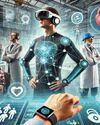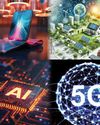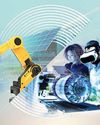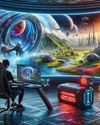
The Covid-19 pandemic underscored how technology is now the mainstay of every organisation's operations. It has influenced everything from the way we shop to the way we manage our money. Digitisation has profoundly changed almost every aspect of operations, altering work cultures for all time to come. The new normal requires businesses to find ways to not only set themselves apart, but also thrive. As it happens, technology has fundamentally transformed the recruitment industry, and this is most evident in large enterprises.
The talent management/recruitment technology market has experienced an explosion over the past few years. A variety of factors, including COVID and the gig economy, are influencing how companies manage talent. Investors backed promising HR technology companies with more than $12 billion in venture capital in 2021, according to Boston Consulting Group.
✓ The Recruitment Industry
As one of the most paper-intensive and tech-resistant industries, human resources has certainly undergone a transformation unlike any other. In the days before the internet, resumes had to be emailed or sent to employers via snail mail. One had to look through job postings in the newspapers, find the addresses of such companies, and then start the application process. Globally, the HR process changed as technology, internet, and artificial intelligence took over.
Curiously though, even as employee engagement, payroll management, and other functions moved into the digital realm, recruiting (for enterprises/employers as well as talent sourcing firms) remained largely traditional.
▾ Is technology helping recruiters?
この記事は PCQuest の September 2022 版に掲載されています。
7 日間の Magzter GOLD 無料トライアルを開始して、何千もの厳選されたプレミアム ストーリー、9,000 以上の雑誌や新聞にアクセスしてください。
すでに購読者です ? サインイン
この記事は PCQuest の September 2022 版に掲載されています。
7 日間の Magzter GOLD 無料トライアルを開始して、何千もの厳選されたプレミアム ストーリー、9,000 以上の雑誌や新聞にアクセスしてください。
すでに購読者です? サインイン

Brace for the threats of 2025 and beyond
As technology evolves, so do the threats. From Al-driven malware to quantum computing risks, staying ahead requires resilience, innovation, and zero-trust models

How will wearable tech be transformed in 2025?
In 2025, wearables transcend gadgets, becoming personal health allies woven into your life-literally. From Alpowered insights to smart clothing, these tech companions redefine wellness, seamlessly blending style, intelligence, and connectivity into every step you take

Innovations shaping the future of computing
The future of tech is here: foldable screens, Al-driven CPUs, sustainable designs, and 5G connectivity are reshaping computing. Dive into how these innovations converge to create smarter, greener, and endlessly versatile digital ecosystems by 2025

Smartphone in 2025: What lies ahead
Smartphones won't just fit in our pockets-they'll mold to our needs. With AI that anticipates, displays that stretch and fold, and batteries that never quit, they'll be our creative partners and personal assistants

Transforming realities and industries by 2025
Soon, Al-powered AR/VR will revolutionize industries, blending hyper-realistic experiences with real-time adaptability. From healthcare and education to retail and enterprise, these immersive technologies-supercharged by 5G and wearables-promise to redefine how we learn, work, shop, and connect

Innovating for a sustainable tomorrow
Technology isn't just advancing-it's evolving with a purpose. Al, green computing, and circular economies are reshaping industries, reducing emissions, and turning waste into wealth. It's a race where innovation meets responsibility, and sustainability becomes the blueprint for a thriving, tech-powered planet

2025: A turning point in technology
The gadgets you own are smarter than ever, the AI you interact with feels less like software and more like a creative collaborator, and even the infrastructure powering it all is kinder to the planet. This isn't sci-fi-it's where we're headed

Gaming in 2025: A new era for play
By 2025, gaming will break free from screens, blending reality with digital worlds. Virtual adventures, Al-driven stories, and social metaverses will turn play into a global playground where connection, creativity, and competition redefine what it means to game

Open-Source vs. Proprietary AI models
The clash between open-source and proprietary AI models shapes the future of innovation. Open-source drives customization and collaboration, while proprietary excels in polished solutions. Their coexistence empowers businesses to balance flexibility, performance, and ethics in a rapidly evolving AI landscape

Cloud and Edge AI: The perfect power couple of 2025
Cloud and edge AI are revolutionizing technology, blending global scalability with real-time precision. From smarter cities to personalized healthcare and immersive gaming, this synergy promises faster decisions, better security, and endless innovation, shaping a future of unparalleled possibilities